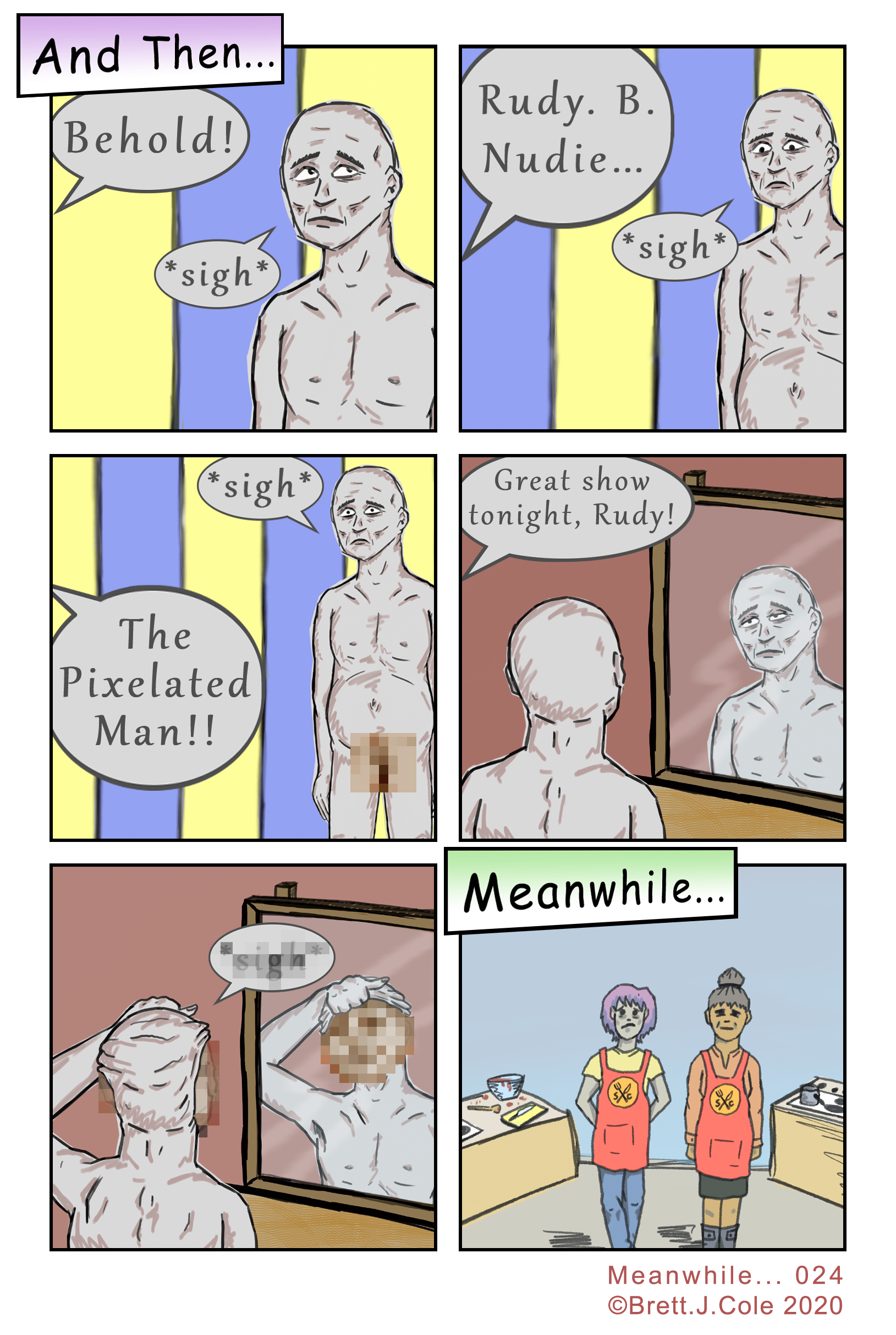Meanwhile… 024
This theme is about something called “Masking”, and normally when I write a narrative for one of these instalments, it flows out rather effortlessly, but this one’s proven hard to write. Possibly because it’s something I’m still getting accustomed to having done in the past, along with a greater awareness of when, how and if I continue to do it. The difference now is that I’m trying to make it my choice to do so, on my own terms.
Masking. It’s a thing. And it’s very tiring.
Essentially, part of being Autistic can be having to “mask” when socialising and interacting with others. While the term might imply something of presenting a false pretence, it isn’t that at all. Masking, in itself, isn’t anything disingenuous or insincere, what it means is that you’re having to make yourself appear more “present” in your interactions in an attempt to fit in, engage with others, sometimes to even just “be” when you know that you’re not “being” as easily as others do, and it’s an effort.
Speaking for myself, there’s very much a sense of “otherness” that you can feel within yourself as an Autistic person. It’s a feeling that you’re not a part of things in a way that seems so easy for others. And so you adopt traits that others have – again, not in any attempt to deceive, but to fit in.
What might take a simple two steps of internal thought for some when socialising, can take as many as ten for others. Masking is the difference in asking us to negate those steps we’d otherwise take at our own pace and instead jump to the expected conclusion, rather than take the steps we require.
Metaphorically, (and apologies for the ablist metaphor, it was the best I could summon up) that jump can be especially hard on the ankles and more so on the ego when you stumble upon landing. You feel even more so that you don’t fit in and that feeling of failure runs very deep if you’ve felt like a misfit all your life. I’ve had so many of those moments in my lifetime. And they linger. They often very easily swing into bouts of depression and self-loathing because you feel like you’ve failed at what should be the simplest of things – simply “being”.
This is why it’s liberating for many adults who are recognised or diagnosed as Autistics later in life. They suddenly make sense, to themselves and, hopefully, to others who understand what that means to them.
They no longer have to feel weird about needing to stifle all sight and sound if overwhelmed by too much sensory input. They no longer have to feel weird about still wanting to chew their sleeve at the age of 45 when stressed about bills. They no longer have to feel weird about wanting to do anything that’s a comfort that others may find “odd” like touching grass, clapping their hands or clicking their tongue for minutes on end. They no longer have to feel weird about needing their own time and space to navigate what might seem so simple to others.
If you listen to adult Autistics – and I suggest you do, especially if there's anyone, yourself included, who's Autistic in your life, students included – you’ll hear a lot of talk about Masking and how it’s presented itself to them personally, either intentionally or not, in their lives. You’ll hear many adult Autistics explain why realising what Masking actually was, and essentially removing that mask, made them more aware of who they’d always been.
Just as importantly, you’ll also hear talk of their stims and special interests, that which they find comforting or helpful in simply being.
This is also why therapy methods such as ABA (Applied Behaviour Analysis), something long supported by Autism Speaks, are considered dangerous and problematic by many adult Autistics. ABA stifles much of an Autistics natural inclinations to self-regulate by way of stimming and instead “fit in”. ABA sets out to alter the behaviour of the individual so that they will “fit”. It doesn’t recognise the individual so much as conditions them to conform and do what others do. It’s grounded in a lot of the same methodology and structures that Conversion Therapy is in regards to sexual preference. And much like Conversion Therapy, ABA has its own issues in regards to many who’ve grown up with it being applied to them having related issues of depression and suicide later in life.
Masking is a very involved topic and if you are going to look into it, listen to the voices of those who’ve experienced it, both intentionally and otherwise. There are many more people that could maybe explain it better, so I do suggest you read on it further if interested.
As far as this instalment of Meanwhile… goes, this is why Rudy. B. Nudie is tired, not because he has to bear a supposedly pixelated part of himself each night to entertain the crowds, but because he has to cover up so much else.
Masking. It’s a thing.
And it’s very tiring.


